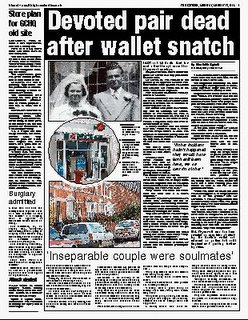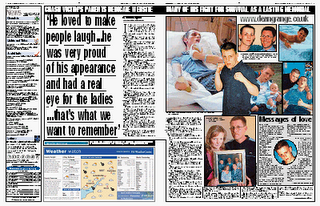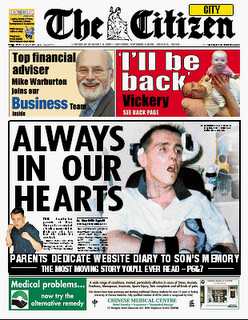Friday, August 04, 2006
Saturday, June 24, 2006
Cooper - theatre star's tragic death

Mark Cooper was just 39 when he died half way through a week of performances.
The talented actor and star of the amateur production of Guys and Dolls had a heart attack after giving his all toa professional theatre audience.
I was taking part in the production and, despite the difficulty for his friends, I was able to produce a fitting tribute to the star and to let people know that the show would go on in his honour.
Friday, June 23, 2006
Rosaline Gilbert - fasted to death


WE had heard that a 34-year-old woman from Gloucester had died suddenly.
I went to investigate. Her family told me she had died devoting herself to God.
It was one of the most moving tales I had heard. Building up the confidence of the family, they told me the story of how Rosaline Gilbert had been on a strict 40 day fast.
But she died 23 days into the fast.
The funeral was the following day and they allowed me to attend the moving service. It was a story that shocked the world.
"A Family is trying to come to terms with the death of a "fantastic" daughter who died while undertaking a religious fast.
Rosaline Gilbert was just 34 when she died on the 23rd day of her 40-day fast.
A strict Christian, her large Gloucester family said she had died devoting herself to her Lord.
They paid tribute to her bubbly and kind nature and fondly remembered her forthright views.
Rosaline's mum Gloria, of Hopewell Street, Tredworth, described her as "my baby, my angel".
Her sister Sharon said: "She was fantastic with the children. My son Nathan, who is 21, was very close to her. I could talk to her about anything and nothing. She was a fashion queen. She always looked great."
And Viva, her 39-year-old sister added: "She was such a lovely person she lit up the room. But she always said what she thought.
"Words can't express what she meant to us. She is with the angels now."
Rosaline grew up with eight sisters and a younger brother at Blenheim Road in Tredworth.
She and her sisters went to Widden Primary School and she later went to Colwell School.
Her father, Vincent, died when she was aged around 14.
Sister Juliet, 36, said: "She went to London when she was about 18 and lived there with friends. But she always considered Gloucester her home - we all do.
"She did a carpentry course but, being Rosaline, never stuck to one thing. She had most jobs from then in catering."
It was around 10 years ago that Rosaline became a devout Christian, and devoted her life to God.
Her family were used to her fasting. Juliet said: "She used to say she was a child of God. She wasn't any particular Christian denomination. She was so strong in her beliefs but she was still the same person - intelligent, bubbly and fashionable.
"She was a free spirit I suppose. She would always say things happened for a reason even if we didn't see what it was.
"She was very to the point and told things as they were. She was the kind of person that said things others wouldn't.
"She had loads of friends both in Gloucester and London."
Her sisters are Madge, 44, Maureen, 43, Maxine, 41, Sharon, 40, Viva, 39, Diane, 37, Juliet, 36, Maryan, 35 and her brother Junior is 23...
She started the fast on March 19, just drinking water and reading the Bible.
Juliet said: "We think she maybe hadn't drunk enough water. She was starving herself and it must have been too much for her body to take."It is such a shock. She was a healthy young woman and our baby. But she would have found some peace devoting herself to God."
Examples of how the rest of the world reported it:
(newspapers across Britain, US, Europe, Australia and New Zealand ran the story)
http://www.telegraph.co.uk/news/main.jhtml?xml=/news/2006/05/09/nfast09.xml&sSheet=/news/2006/05/09/ixuknewsnew.html
http://www.guardian.co.uk/religion/Story/0,,1770476,00.html
http://www.kath.net/detail.php?id=13608
http://www.rknieuws.net/rorate/scripts/nws_art.php?id=25803
Sunday, June 18, 2006
Jack and Lil - two lives for £250


The genuinely tragic tale of Jack and Lil who both died after he was mugged. Jack Martin was robbed of his pension outside a post office. When his fragile wife saw his injuries, the stress took its toll on her health.
She died a few days later. After the funeral, Jack hanged himself at their marital home. They had no children and had lived for each other.
Tribute to Dean Grange

 The story of Dean Grange and his family touched the hearts of many people. The family were devastated when he was left in a vegetative state after a car accident. Their tribute to their son:
The story of Dean Grange and his family touched the hearts of many people. The family were devastated when he was left in a vegetative state after a car accident. Their tribute to their son:It has stood as a heartbreaking tribute to a much-loved son. But a website which charts the progress of Dean Grange after he suffered brain injuries in a car accident, will now be his lasting memorial.
Dean's suffering came to an end last Wednesday, less than a week after his 25th birthday. The former Gloucester student was just 21 when he was involved in a horrific crash in August 2002.
Dean, who was a passenger in a friend's car, suffered serious head injuries including a swelling on the brain.
As his family struggled to come to terms with the fact they could lose him, or that he would be seriously brain damaged for the rest of his life, they set up a website.
The aim was to let friends and family be part of Dean's fight for survival.And in the darkest of hours, Dean's parents Paul and Veronica, of Thompson Road, Stroud, have been writing regular progress reports on the website dedicated to their son.
They share their mixed emotions at watching their fun-loving, strong and independent son struggle to do the most basic tasks.
And people from across the world have followed their journey from the initial shock and doubts that he would survive, through their hopes for recovery - moments of joy and unswerving love for Dean.
Across the website they urge motorists to cut their speed.Dean's dad Paul said: "Since the accident, it has really taught me and the rest of the family that we should treasure each and every moment.
"We are trying to hold on to all those memories we have of him before the accident. He could be a pain sometimes, but we loved every moment we spent with him."
Now his parents, brothers Darren, 27, and Robert, 20, and his nieces Shaneen, 10 and nine-month-old Ellie and nephews Caine, seven, and one-year-old Ronan, want to remember the lively lad Dean was before the accident.
Mr Grange said they all kept a bedside vigil throughout Dean's ordeal.
He spent hours tending his son throughout his time in various hospitals and care homes - cutting his hair, brushing his teeth, massaging him, trimming his nails and even taught him to wipe his mouth.
"I wanted him to be at the very high standard of cleanliness which he kept himself," said Mr Grange.
The family are experiencing a tremendous mix of emotions of grief and heartache - relief that Dean's pain is over and joy that they still have so many fond memories of their son.
"He was a real joker," said his mum. "We argued furiously but I'm sure he would start it just to get a hug afterwards.
"He loved to make people laugh and he had so many friends. He was very proud of his appearance and had a real eye for the ladies.That's what we want to remember.
"That was what was really frustrating - after the accident he just had an empty expression."
His dad said Dean was very fit and strong and keen on body building.
"He was a chunky as a baby," he said. "I remember as though it was yesterday, picking him up in my arms and thinking it. He was multi-talented and could do whatever he put his mind to. We took him water skiing a few years ago. He had never done it before and everyone else was struggling but he was like a duck to water.
"We tried to throw him off with a few quick turns but he was too good!
"He loved fast cars and pretty women and I suppose that was what got him in the end."
Dean was born on January 13, 1981 at Stroud Hospital.The family lived in Stonehouse before moving to Wellington Street, Gloucester.Dean went to St Paul's Primary School, where his head teacher summed him up as "a likeable rogue", and Beaufort Community School but had home tuition from the age of 13.
He later moved to Hull, and Leeds, but came home in December 1999 to his parents' current home in Thompson Road, Stroud.
At the time of his accident, Dean seemed to have found his niche and was renovating a home for a friend's father, who had nothing but praise for his hard work, strength and good spirits.
He was also planning to create self-build homes in Tenerife with friends, and had been making his car roadworthy but was unable to afford the insurance.
On the evening of the accident, Dean and his dad, who has suffered from heart problems due to the stress of the accident and its aftermath, had a disagreement before he went out.
Mr Grange said Dean was unaware he was upset and left happy, with a great big smile, pleased to be going out with friends.
But less than an hour later, the phone rang with the devastating news about the crash.Mr Grange, 46, said Dean, who had suffered fits since 2003, died on Wednesday after a severe fit at Badgeworth Court care home the previous day. Dean had bronchial pneumonia.
Monday, June 12, 2006
Sri Lanka - post tsunami

I visited Sri Lanka in July 2005 - just over six months on from the devastating tsunami which shook the coast of this beautiful island.
I had never been before and I felt priviledged to be able to go to the country and report back to the tens of thousands of readers who had raised so much money for Unicef's campaign.
What I saw was a lot of devastation and lives ruined by death and loss. But there was also remarkable hope in the faces of the children and adults.
Yes, there was disillusion with how quickly the rebuilding was taking place. There was anger and fear but pride and bravery too.
I spoke to a child who had lost her mother. Her father had died some years before and when she had made sure her little brother was safe from the waves, she went to look for her mother. She found her dead by a church. She was hardly a teenager and had the world on her shoulders. But she had such a fantastic glow and smile. She was one of hundreds.
What was so remarkable was the rebuilding process and the chance it gave farsighted people to build back better - something Unicef was encouraging.
It might have seemed thousands of miles away from us at the time and displaced except for the British or western friends and family caught up - but often these were not people who had nothing and continued life with nothing.
For many who lost things, they were people who valued their possessions and were as house proud as anyone. It was they who were suffering the most psychological damage. It was frightening but heartening to see how they were coping with getting their lives back on track.
An extract:
WHEN a tsunami struck the shores of Sri Lanka on December 26 it killed thousands of people and left a trail of destruction in its wake.
For the survivors, the landscape which had once been a beautiful and tranquil home was turned into a wasteland. More than 500,000 people were left homeless and powerless.
Yet the aid given to charities has enabled many Sri Lankans to start rebuilding their lives and to find some kind of shelter after the storm.
The staggering amount of money raised by Citiz en readers has truly made a difference.
We launched our appeal with Unicef within hours of the disaster and it has so far raised more than £270,000. After the tsunami, those who lost their homes took shelter in makeshift tented camps. Some erected shelters on the spot where their home had been.
Seven months after the disaster, the camps are being replaced by temporary shelters, many donated by organisations such as Unicef ’s sister organisation UNHCR, the UN’s
refugee agency.
Around 80% of the temporary shelters have been completed but thousands of people are still living in clusters of brightly coloured hot and humid tents.
Many victims cannot understand why they have not yet been given a permanent home by the Sri Lankan government.
B. K. Ginandara and her husband A.E. Sunil have three children. They are living in a temporary shelter at Weligama on the south coast after their home was swept away.
Although safe and sheltered, they have no prospect of a permanent home.
Clutching her sick 10-month-old baby boy Nuraj, Ginandara said: “We had a house which we built at the side of my father’s home so it was not recognised by the government as a separate house.
“My father and his family will be given a permanent home but the government will not give us one because they class us as all the same family, as one unit.
“The new house will not be big enough for all of us. I don’t know what we will do. We have lost everything so we cannot buy a home or build a house.
“We have an eight-year-old son at school and a four-year-old too. My baby is sick. It is so dusty here – it is not good for the children.”
A needs assessment programme funded by Unicef showed that the semi-permanent camps get too hot during the day and at the Senanayake Ground, where Ginandara and her family live, the homes flood when it rains because of the poor drainage. In some camps at Weligama, there are problems with mosquito breeding grounds which
could spread dengue fever.
In Galle, facilities are overcrowded and lack privacy, and common problems across the affected regions include poor electricity supplies, security and high temperatures.
Geoffrey Keele, communication officer at Unicef Sri Lanka, said it was difficult to discover where the greatest needs were because some families, mainly middle class,
are staying with friends and family rather than remaining in camps.
He said people were confused about a rule which prevents building within 100 metres of the shoreline and said it was slowing progress. The government has said it
will enforce the buffer zone around the coast so homes, schools and businesses will be at least 100 metres from the shore.
At the village of Peraliya in the south west, where a train carrying 1,700 people was toppled by the tsunami a woman pointed out a hastily constructed wooden shed
metres from the rust-coloured carriages of the broken train. It stands in the place where her former home stood, about 70 metres from the shore.
“This is my home now,” she said. “The tsunami took my home and people from Denmark built me this. I will not move further away. If another tsunami comes, I will die here.”
Mr Keele said: “It is not law yet but the government are now saying the rule has always been there but not practised. But people do not know what is happening and everything feels very up in the air.
“Some are rebuilding and some are waiting. Some do not want to rebuild near the sea.
“The problem is that the government has to relocate tens of thousands of families and it is a very long process. They have to discover who owns the land. Many people were pretty much squatters and had built tiny huts between the ocean and the rail
tracks. It takes around a year for the planning permission and so on.
“It has been over six months since the tsunami but this is going to take years.
“We also want to make sure that we build back better with everything – schools, homes and healthcare – so that we are not just replacing things but taking the opportunity to make things better. It will give children and their families better
opportunities.
“With schools, Unicef are taking six to 12 months longer than most NGOs (non-government organisations) to make sure they are up to child-friendly standards. Each is going to be a flagship school where we know the needs of the children
and the community rather than being just bricks and mortar.
“We also have to be careful that we are not creating or worsening disparities across the country. The north has been badly affected through years of conflict and there is a very real poverty belt in the centre of the country. We do not want to aggravate
tensions between people who are getting help after the tsunami and those who also need help.”
http://www.thisisgloucestershire.co.uk

